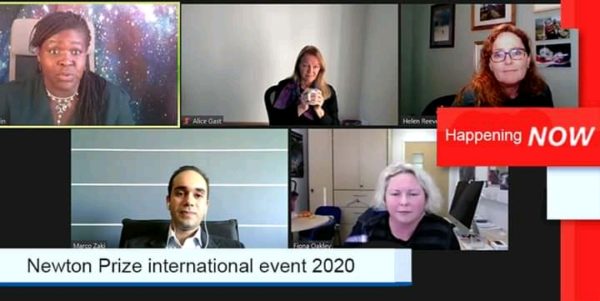
Ashraf AboArafe
November 4 2020, CAIRO – The Newton Fund celebrates Dr Marco Zaki from Minia University, the Egyptian winner of the Newton Prize 2020, for his project on “The Liver Microenvironment- A Driver of Hepatocellular Carcinoma”; a project managed and delivered by the British Council and the Cultural Affairs and Missions Sector at the Egyptian Ministry of Higher Education & Scientific Research.
The project was developed in collaboration between Newcastle University and Minia University, and focuses on different mediums and ways to halt the progression of liver cancer by finding biomarkers in the blood.
Dr Zaki was announced as a winner of the Newton Prize 2020 alongside four other scholars from Jordan, Kenya, Turkey and South Africa, out of 27 shortlisted applicants in total, during a virtual award ceremony today hosted by the Newton Fund. The winners were selected by the Newton Prize Committee, chaired by Professor Alice Gast, President of Imperial College.
Each winner will receive £200,000. This prize money will contribute to the future science and innovation activity of each winning partnership.
Dr Zaki said: “Prevention is not only about prohibiting disease from occurring, it is also about establishing a stronger research environment that can effectively support our efforts to beat the disease. This is what we want to achieve in Egypt. I am glad that all the hard work has paid off.”
The winners of the Newton Prize are Newton grantees , who previously received scholarships or scientific research funding from the Newton Fund. Each year the Newton Prize, administered by UNESCO, enables international research partnerships between the UK and Newton Fund countries, such as Egypt, to continue working together on solutions to some of the world’s key challenges. Some of those challenges include the problem of producing clean energy, HIV prevention, the protection of historical sites, water pollution, as well as the current COVID-19 pandemic.
Research and innovation in these areas is recognised as an effective way to help countries achieve SDGs and improve the quality of life for people in developing countries, as well as in the UK. Egypt, for example, is one of several Arab countries which have raised their level of domestic spending on Research and Development (R&D) in recent years. Egypt invested 0.71% of GDP in R&D in 2016, almost double 2010 figures, according to the UNESCO Science Report of 2016.
Elizabeth White, Country Director at the British Council in Egypt, said: “Cross-cultural collaboration in the science field is vital for tackling global challenges and addressing issues such as poverty, climate change, and peace and security in developing countries. Our work in Egypt over the past 6 years has strengthened innovation and scientific research in both Egypt and the UK, and is a result of our continuous effort to foster this collaboration between UK and Egyptian scientists, institutions and universities.”
The Newton Fund is managed by the UK Department for Business, Energy and Industrial Strategy (BEIS) and delivered in Egypt under the name “Newton Mosharafa Fund”. It is the largest bilateral agreement in the field of science and innovation in Egypt providing partnerships, including joint research projects and PhD scholarships, across different priority areas, such as healthcare, renewables, food production, climate change, and other development issues.
The British Ambassador to Egypt, Sir Geoffrey Adams, said: “Congratulations to Dr Marco Zaki on this monumental achievement. His project on halting the progression of liver cancer is a testament to the importance of UK-Egypt partnership in science and innovation. This is the first Newton Prize to be awarded to an Egyptian researcher, and gives a boost to our cooperation in the fields of science and research, which have never been more important.”




